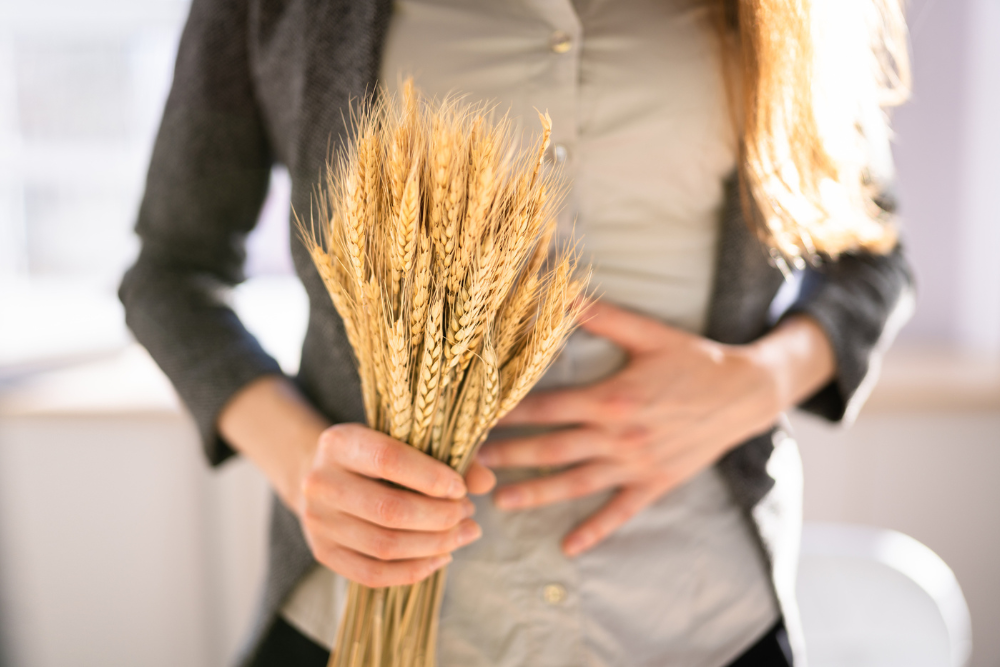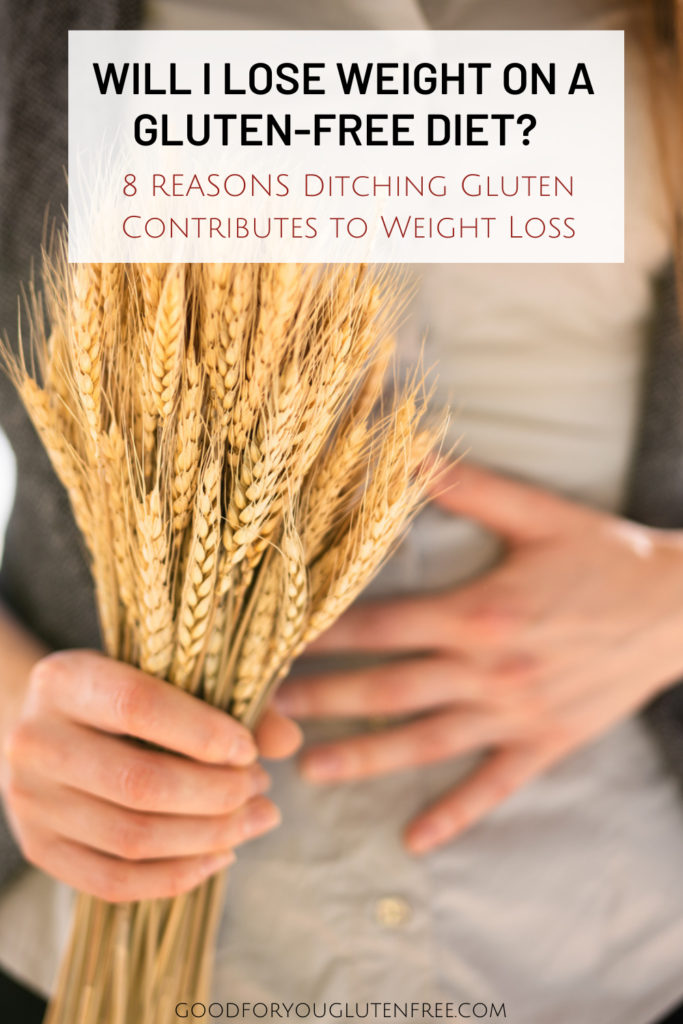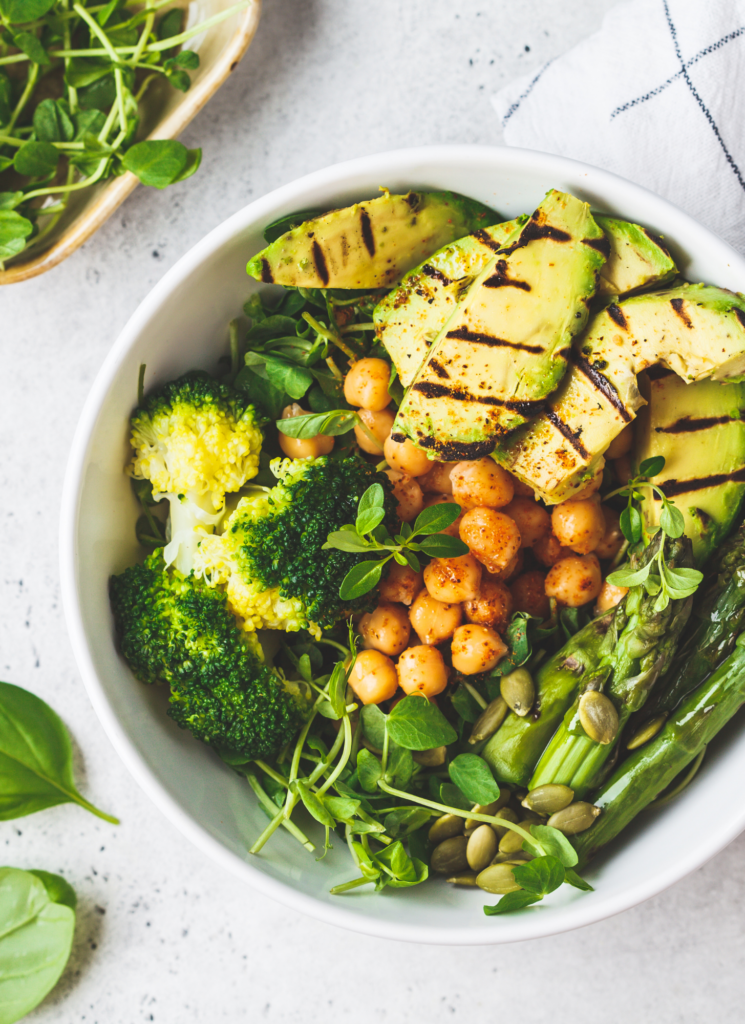
Gluten-free diets are more popular than ever, likely because many people tout it as a quick weight-loss solution. But is a gluten-free diet a weight loss diet, and do people lose weight when they go gluten-free? In this article, I’ll get to the bottom of whether a gluten-free diet promotes weight loss and whether it’s the healthy “diet,” it’s touted to be. This post contains affiliate links. Please see my disclosures and disclaimers.
Prefer to listen to this article instead?
Over three million Americans will follow a gluten-free diet in 2023, and the global market for gluten-free products is estimated to be worth $43.65 billion by 2027.
Of those three million, 72 percent are classified as “PWAGs” – people without celiac disease avoiding gluten.
People with celiac disease can’t eat gluten, a protein found in wheat, rye, and barley, because it triggers an immune system attack that damages the small intestine and leads to bloating, diarrhea, nutrient deficiencies, and dozens of other painful and annoying symptoms.
However, people without celiac disease can eat gluten but choose not to. Why?
Emerging research and personal stories from millions of people have credited the gluten-free diet with helping them resolve unexplained health issues and lose weight.
While the gluten-free diet was never intended to be a weight loss diet, no one can deny that it has helped millions of people shed unwanted pounds and feel great.

8 Reasons Why People Lose Weight on a Gluten-Free Diet
Considering implementing a gluten-free diet to lose weight? The following eight reasons might explain why some people lose weight when they go gluten-free:
(1) They’re Addressing a Hidden Gluten Intolerance
While it’s widely documented that people with celiac disease must go gluten-free, it isn’t as clear-cut for people who test negative for the autoimmune disease.
Eighteen million people in the U.S. have been diagnosed with non-celiac gluten sensitivity or gluten intolerance.
Gluten intolerance is typically diagnosed by an elimination diet, and there are blood tests that can diagnose gluten intolerance, albeit the tests aren’t widely approved by the medical community (yet).
Gluten intolerance has been tied to widespread inflammation in the body. It is blamed for making people feel bloated, gassy, and tired, and it’s known to manifest itself as inflammation in the thyroid, brain, skin, joints, or anywhere a person is genetically weak.
Inflammation can impair digestion, as well as cause the body to swell and retain water, all of which can contribute to weight gain.
When a gluten intolerance is managed via a strict gluten-free diet, inflammation dissipates, normal digestion resumes, and a person has more energy and fewer aches and pains, if any.

(2) They’re Eating Less “Bad-For-You” Food
People may lose weight on a gluten-free diet because they eat less bread, pasta, pastries, pizza, and other inflammatory foods and grains.
If a person eats whole, nutrient-dense, naturally gluten-free foods, they can shed pounds and keep it off.
However, if they become reliant on packaged foods, fast foods, fried foods, and sugary foods, then Houston, we have a problem.
(3) They’re Eating More “Good-For-You” Foods
When people ditch gluten, they naturally lean into more whole, fresh, and naturally gluten-free foods that typically contain less saturated fats, calories, sugar, and refined carbohydrates.
Fruits and vegetables are loaded with fiber, nutrients, and antioxidants that reduce oxidative stress inside the body. Eggs are naturally gluten-free and highly bio-available, which means the body can quickly absorb the nutrients from eggs.
Fruits and vegetables have many anti-inflammatory properties, meaning they aim to reduce inflammation in the body.
For a gluten-free diet to be considered a “weight-loss” diet, a person must remove gluten and other foods that cause inflammation and add anti-inflammatory foods or foods that reduce inflammation.

(4) They’re Taming Inflammation
Gluten is a highly inflammatory food that researchers found creates inflammation in all humans, not just those with gluten intolerance and celiac disease.
Take, for example, a person who is hit in the head. Their immune system floods the damaged area with blood, fluid, and proteins. This is the immune system doing its job and signs of a normal immune system response.
However, when a person is constantly assaulting their gut with inflammatory foods (e.g., gluten, sugar, red meat, carbonated sodas, fried foods, etc.), they’re creating this chronic state of inflammation inside their digestive system.
Such inflammation will likely lead to chronic fluid retention and swelling, which will result in weight gain.
Dr. Mark Hyman says, “If you don’t address inflammation by eliminating hidden food allergens or sensitivities and by eating an anti-inflammatory diet, you will never succeed at effective and permanent weight loss. Hidden sensitivities and allergies to food you eat every day are making you sick and fat.“
He adds that while everyone is different, specific foods are known to create inflammation more than others… and he puts gluten at the top of his list of inflammatory foods!
(5) They’re Avoiding Wheat, an Appetite Stimulant
A person may find their weight goes down after they break up with gluten because, as Dr. William Davis says of Wheat Belly fame says, wheat is a “potent appetite stimulant.”
Dr. Davis says wheat is highly addictive, and eating just some of it triggers appetite-stimulating compounds in the brain that demand a person eat more of it.
However, when someone eliminates wheat, they eliminate the stimulant telling their brain to eat more wheat.
Dr. Davis writes on his website, “Wheat is addictive in the sense that it comes to dominate thoughts and behaviors… if you don’t have any for several hours, you start to get nervous, foggy, tremulous, and start desperately seeking out another “hit” of crackers, bagels, or bread, even if it’s the few stale three-month-old crackers at the bottom of the box.”
He adds, “But the “high” of wheat is not like the high of heroine, morphine, or Oxycontin. This opiate, while it binds to the opiate receptors of the brain, doesn’t make us high. It makes us hungry.”
He also says that a protein inside of wheat, gliadin, is capable of causing a person to consume an excess of 440 more calories per day.
That means when a person goes gluten-free, they will no longer be controlled by intense cravings for wheat and may perhaps consume 440 fewer calories per day!
(6) They Balance Their Blood Sugar Levels
Researchers say gluten-free foods, such as gluten-free starches and flours, are traditionally low in fiber, micronutrients, and protein, and they present higher on the glycemic index.
These foods can, in turn, lead to blood sugar spikes, which in turn can lead to weight gain.
By switching to a gluten-free lifestyle, a person will naturally reduce their consumption of grains and minimize blood sugar spikes.
However, be careful to avoid gluten-free junk food. At the end of the day, gluten-free junk food is just junk food and will contribute to blood sugar spikes.
(7) They Heal Their Guts
A healthy gut can contribute to weight loss by helping to regulate appetite, digestion, and the absorption of nutrients.
The gut microbiome is comprised of trillions of bacteria and other microorganisms living in the digestive tract. These microorganisms are essential in maintaining overall health by aiding digestion and metabolism.
An unhealthy gut microbiome can lead to inflammation, interfering with the body’s ability to absorb nutrients and store energy efficiently. This can lead to weight gain or difficulty losing weight.
To maintain a healthy gut and support weight loss, a person must eat a balanced gluten-free diet that includes plenty of fiber-rich foods such as fruits, vegetables, whole grains, legumes, nuts, and seeds.
Probiotic-rich foods, such as yogurt, kombucha, or kimchi, can also help to promote a healthy microbiome. Reducing stress levels and getting enough sleep is vital for maintaining good gut health.
(8) They Increase Their Energy Levels
When someone reduces inflammation and begins to lose weight due to a gluten-free diet, they may have more energy.
And with more energy, they can live a more active – and less sedentary – lifestyle, which contributes to maintaining a healthy weight and good digestion. Instead, they’re using a gluten-free diet to jumpstart an overall healthier and more active lifestyle.

Don’t Be Fooled by Marketing Hype
Remember, just because a product is labeled “gluten-free” and marketed as a “health food” doesn’t mean it’s calorie- or sugar-free.
A bag of gluten-free cookies is no better than a bag of regular cookies. Sugar is gluten-free but is far from considered a “healthy” food.
Also, following a gluten-free diet won’t guarantee weight loss; some people with celiac disease actually gain weight when they go gluten-free.
Anyone who relies on packaged foods and fast food without curbing their sugar cravings will struggle to lose weight.
Those who eat healthy, whole, unprocessed, and naturally gluten-free foods will find the most success with a gluten-free diet. That’s because they’re not trading pizza for gluten-free pizza.
How I Can Help You
If you want to maintain a healthy weight while following a gluten-free diet, I have a few resources to help you.
(1) Master meal planning. Planning your meals will ensure you always eat healthy, balanced, and nutrient-dense gluten-free meals.
- Read: 15 Essential Gluten-Free Meal Planning Strategies for People with Celiac Disease and Gluten Intolerance
- Download: 45 Healthy Gluten-Free Recipes and Sample Meal Plans
- Download: 4-Week Clean Eating Meal Plan and Guide
(2) Master the gluten-free diet. There’s a right and wrong way to implement a gluten-free diet. To ensure you get gluten-free right, I recommend signing up for my SIGNATURE Gluten-Free Course. You’ll learn how to go gluten-free and heal your body.
(3) Get help: You don’t have to do this alone. Schedule a 1:1 coaching session with me to discuss what a healthy, gluten-free diet looks like and how I might be able to support your journey.
Parting Words
A gluten-free diet promotes weight loss by addressing hidden gluten intolerance, reducing inflammation, creating balanced blood sugar levels, and promoting healthier eating habits.
And while a gluten-free lifestyle can help a person lose weight healthily and sustainably, it’s not for everyone.
Anyone considering a gluten-free diet should consult their doctor before making dietary changes.
Additional Reading
Enjoy these articles, too:
- STOP! Don’t Go Gluten-Free Until You Read This Article
- 5 Dangers Associated with the Gluten-Free Diet
- Supplements for Celiac Disease and Gluten Intolerance
- 200+ Foods You Can Eat on the Gluten-Free Diet
- 10 Naturally Gluten-Free Foods Every Celiac Should Be Eating
- 10 Tips to Getting Started on a Gluten-Free Diet
Leave a Comment